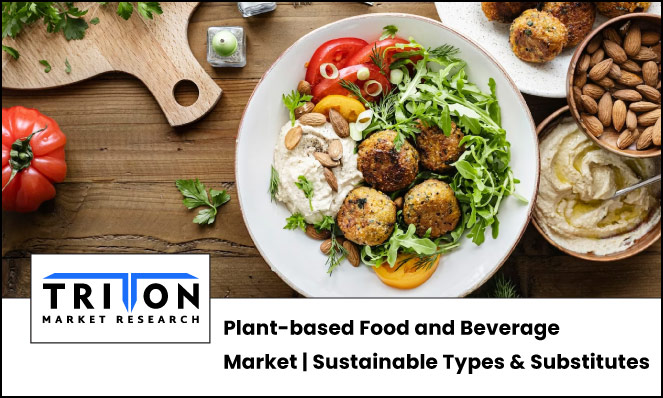



27, July 2023

While many of us associate ‘meat’ with traditional animal products such as steaks and hamburgers, the United States Department of Agriculture (USDA), responsible for regulating meat and poultry, has a distinct perspective that defines meat as skeletal muscle and edible organs (e.g. liver, tongue) sourced from cattle, sheep, swine, and goats. However, animal-based meat, primarily sourced from muscle, is associated with numerous health issues, which is pushing demand for plant-based meat substitutes. According to Triton Market Research’s report, the global plant-based food and beverage market is expected to reach $84914.17 million by 2030, growing at a CAGR of 10.91% during the forecast period.
The increasing popularity of a plant-based diet and growing awareness of meat consumption have led to higher demand. According to the International Food Information Council (IFIC), 65% of Americans surveyed have eaten meat substitutes, with 20% consuming meat-like products at least once a week.
Shift towards Veganism - The veganism trend is growing worldwide because of proven benefits, including weight loss and higher intake of key nutrients such as magnesium and folic acid. Scientific evidence shows that a vegan diet improves emotional and physical health, alleviates depression, and reduces obesity. In the United Kingdom, 46% of people aged 16 to 75 are considering cutting back on animal products. Also, 15% of consumers in the UK reported reducing or eliminating dairy consumption.
Technological advancements and increasing consumer preference for organic and non-GMO supply chains (GM) have driven the Europe plant-based food and beverage market. It is expected to grow at a CAGR of 10.91% during the forecast period.
Rise in Lactose Intolerance - Lactose intolerance, caused by the inability to digest the lactose in dairy products, results in symptoms such as abdominal pain, flatulence, etc. More than 60% of the world’s population is affected by lactose intolerance. Adults of East Asian origin are most commonly affected (70-100%), followed by Native Americans, Asians, Mediterranean region, and Jews (75-90%). Plant-based alternatives such as almond, coconut, and rice milk have fewer calories and less fat than cow’s milk while providing important nutrients that reduce the risk of diseases. The increasing focus on health and wellness has driven high demand for plant-based food and beverages.
Textured vegetable protein are witnessing a rapid surge, especially in meat analogs and substitutes, particularly hamburgers and sausages. The rising demand for ‘free from’ foods and clean living has further increased the popularity of the segment. The Archer-Daniels-Midland Company (ADM) has a product range of textured soy protein, with 60-80% protein, named Nutrisoy. According to Triton’s report, the textured vegetable protein segment was valued at $4522.51 million in 2022 and is expected to grow at a CAGR of 10.86% during the forecast period.
Growing health consciousness among consumers has increased demand for plant-based protein sources. As per Triton’s analysis, the tofu segment is estimated to rise with a CAGR of 10.81% during the forecast period. Recognizing the potential, Tofoo Co has expanded its production capacity at its Yorkshire factory by about 70% by installing new equipment. On the other hand, Tofu King planned to build the largest tofu factory in the UK by 2020 to meet the growing demand.
Tempeh is becoming increasingly substantial due to the growing demand from vegans, vegetarians and flexitarians. It is a convenient and versatile meat alternative with high protein content, suitable for various preparation methods. There is a growing interest in natural, non-GMO, and organic foods for better health. According to Triton’s report, the tempeh segment is expected to generate revenue of $704.89 million by 2030 at a CAGR of 10.63% over the forecasted period. Innovative offerings such as Soy Bean Company’s bright white mushroom-flavored tempeh and Impulse Tempeh in the UK, which has been focused on organic production for 30 years, to sustain in such a competitive market.
The plant-based food and beverage market will continue to thrive, with manufacturers, from startups to dominant leaders, driving rapid innovation by developing novel and sustainable alternatives, leveraging advanced technologies, and responding to evolving consumer preferences. Also, factors such as consumer intolerance for animal protein, a growing vegan population, and increased venture investments, collectively contribute to the steady advancement and expansion of the studied market.
Factors like sustainable products, recyclable packing, revolutionary manufacturing procedures, and innovation create opportunities in the plant-based food and beverage market.
Q2: What geographies are studied in the market?Europe, North America, Latin America, Asia-Pacific, Middle East & Africa.
Q3: Which are the key sales channels of the plant-based food and beverage market?The key sales channels studied in the market are offline sales channel and online sales channel.

Prevalent cases of terrorist attacks in today’s world is increasing the need for severe standards of security for public safety, and the global market for biometric technology scrupulously accommoda..
Prevalent cases of terrorist attacks in today’s world is increasing the need for..